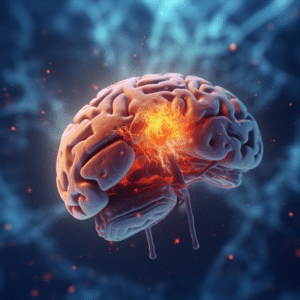Cushing Syndrome is a rare endocrine disorder that affects thousands of people. It occurs when the body has high cortisol levels, which can lead to serious health complications if left untreated.
This article will explain what causes this syndrome and explore some potential treatments for it.
What Is Cushing Syndrome
Cushing Syndrome is a medical condition in which the body makes high levels of the hormone cortisol. It occurs when the body produces too much of this hormone, or when it remains in the bloodstream for extended periods of time.
when the body produces too much of this hormone, or when it remains in the bloodstream for extended periods of time.
Cortisol is an important hormone that regulates how our bodies process and use sugar, fat, and protein. When people have Cushing Syndrome, their bodies have too much cortisol because their pituitary gland makes too much ACTH, a hormone that stimulates the production of cortisol.
Who Get It
Cushing Syndrome is a hormonal disorder that affects 10 to 15 per 1 million people. There are approximately 3,000 to 4,500 individuals who suffer from Cushing syndrome at any given point in time. The occurrence of one type of the syndrome is higher among women than among men, while the other type presents a reversed trend.
What Causes It
Cortisol is the most significant of the glucocorticoid hormones. Its production occurs in the adrenal cortex, where it carries out a wide range of functions, such as regulating the stress response, suppressing the immune system, converting food into energy, and maintaining insulin balance. The hypothalamus controls cortisol production by signaling the pituitary gland to release the adrenocorticotrophic hormone (ACTH). ACTH triggers the adrenal glands to discharge cortisol. Prolonged exposure to excessive cortisol levels can have unfavorable effects on various tissues in the body.
Cushing Syndrome is frequently categorized as either exogenous, meaning originating externally from the body, or endogenous, meaning originating internally within the body, hypercortisolism.
 Individuals who suffer from autoimmune disorders or have undergone organ transplantation may choose to use steroid medications comprised of cortisol to manage their condition or avoid tissue rejection. These drugs can have severe detrimental effects, such as reduced bone density, diabetes, unpredictable mood swings, and hypertension. This medical condition, also known as exogenous Cushing syndrome, is the most frequent variety of hypercortisolism.
Individuals who suffer from autoimmune disorders or have undergone organ transplantation may choose to use steroid medications comprised of cortisol to manage their condition or avoid tissue rejection. These drugs can have severe detrimental effects, such as reduced bone density, diabetes, unpredictable mood swings, and hypertension. This medical condition, also known as exogenous Cushing syndrome, is the most frequent variety of hypercortisolism.
The development of Endogenous Cushing Syndrome occurs as a result of excessive secretion of ACTH by the pituitary gland or other tissues, or due to over-secretion of cortisol by the adrenal glands. This condition is often referred to as one of the following types:
- Pituitary adenoma. The occurrence of a benign mass on the pituitary gland that produces irregular levels of ACTH leads to a medical condition called Cushing disease. Females are five times more likely to develop this condition than males.
- Ectopic ACTH syndrome results from the production of ACTH by non-pituitary tissues. The main source of ACTH in this condition is usually cancer cells found in the lung, pancreas, thymus, or thyroid gland. Interestingly, men are affected by the syndrome three times more frequently than women.
- Adrenal tumors. On occasion, the adrenal glands may develop tumors that cause an overproduction of cortisol. These tumors can either be harmless adenomas or nodules or cancerous growths on the adrenal glands.
Signs And Symptoms of Cushing Syndrome
Patients with Cushing’s typically experience physical signs such as unexplained weight gain, fatigue, and weak muscles. [More Causes of Fatigue] The main symptoms of Cushing syndrome may include:
- Unexplained Weight Gain: Cortisol increases appetite and causes people to crave sugary foods, which can result in significant weight gain. The most identifiable indicator of Cushing’s syndrome is the development of adipose tissue in the face and neck, creating a “moon face” appearance, and in the belly and upper back. The arms and legs often experience a significant loss of mass and strength.
- Weak Bones: Prolonged exposure to high cortisol levels can harm the collagen that provides support. This can result in bone deterioration due to the weakened collagen matrix responsible for calcium deposits, and lead to thin, fragile skin that is prone to purple stretch marks. Additionally, the illness can greatly weaken the superficial fascia. Additional common symptoms of elevated cortisol levels may include elevated blood pressure; raised levels of blood sugar; an increased possibility of diabetes; mood changes that include irritability, apprehension, and despondency; a severe form of acne; reduced rate of wound healing due to immuno-suppressed system functions; acceleration in the growth of excess body hair; irregular menstrual cycles in women; and lowered fertility alongside decreased libido and erectile dysfunction for men.
Cushing Syndrome Diagnosis
A diagnosis of Cushing Syndrome requires the presence of characteristic symptoms and a series of tests to confirm elevated cortisol levels. Physicians and medical professionals take into account an individual’s history and physical examination, saliva, urine, and blood tests for hormone measurements, imaging studies such as MRI or CT scans, and other specialized tests to make a definitive diagnosis.
It is important to note that not all cases are alike; some individuals may require only one test, while others may need multiple tests to measure the amount of cortisol in their blood.
Physicians will also perform additional tests if they suspect that underlying cancer might be causing Cushing Syndrome. These include evaluating ACTH levels, measuring urinary-free cortisol (UFC) concentrations, and conducting genetic testing for mutations in specific genes associated with this disorder.
With early detection and proper treatment management techniques like lifestyle modifications and drug treatments tailored specifically for each patient’s needs, people living with Cushing Syndrome often go on to lead full lives.
Cushing Syndrome Treatment
Treatment of Cushing’s syndrome can vary depending on what caused it. Regardless of how this condition manifests itself, it’s important for patients to understand that the type of treatment depends heavily on accurate diagnoses. Without this information, attempting different treatments without success could lead to further medical complications.
Exogenous Cushing Syndrome is treated by reevaluating the correct dose of corticosteroid drugs to achieve the best benefits with the least risk.
Pituitary adenomas are usually surgically removed, either through a surgery conducted through the upper jaw or nose into the brain or through radiation aimed at the growth from different angles to kill the tumor without damaging nearby brain tissue.
Cushing syndrome, brought about by cancer cells that secrete ACTH, is treated by dealing with the cancer, but drugs that inhibit cortisol may also be used to treat the problem.
Individuals must take all necessary steps to get properly diagnosed and treated by their healthcare provider so they can manage their symptoms effectively and get back to living life with improved well-being.
Is Massage Good For Cushing Syndrome
Massage therapy has been used as an alternative form of treatment to improve symptoms associated with Cushing Syndrome. Studies have shown that massage alleviates stress hormones like cortisol while improving circulation, which reduces inflammation.
Additionally, it increases endorphin levels to promote relaxation and reduce pain sensation. Massage can also help alleviate physical issues such as weakened muscles due to Cushing Syndrome.
 A massage therapist will use light pressure and stretching techniques to stimulate weak areas and increase blood flow for improved healing. Massage helps release toxins from tight fascia surrounding muscles and encourages range of motion for improved mobility in affected joints and ligaments. The massage therapist will need to keep in mind the risks of high blood pressure, delicate bones, the possibility of diabetes, and a compromised immune system.
A massage therapist will use light pressure and stretching techniques to stimulate weak areas and increase blood flow for improved healing. Massage helps release toxins from tight fascia surrounding muscles and encourages range of motion for improved mobility in affected joints and ligaments. The massage therapist will need to keep in mind the risks of high blood pressure, delicate bones, the possibility of diabetes, and a compromised immune system.
All these benefits combined make massage a great choice for those suffering from this syndrome – providing relief from its debilitating effects without any side effects or risks associated with many other treatment options available today. Schedule your appointment here.
Conclusion
Cushing Syndrome is a serious condition that affects thousands of people around the world. While it can be uncomfortable and difficult to manage, there are treatments available for those suffering from this condition.
With proper diagnosis and treatment, Cushing Syndrome can be managed effectively to improve quality of life.
Understanding and recognizing the signs and symptoms early on is important so you can get the right help before things become too complicated or unmanageable. If you think you may have Cushing Syndrome, don’t hesitate to reach out for support and ask your doctor about what options might work best for you.





